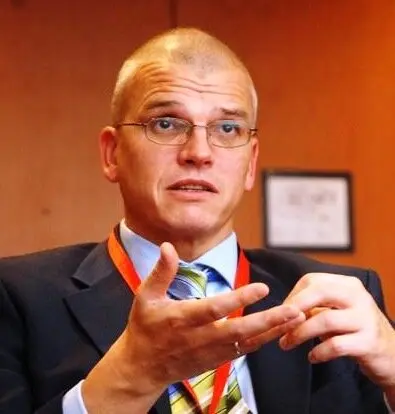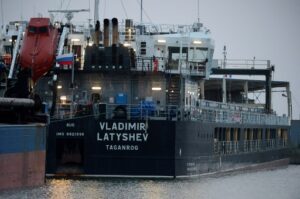Timothy Ash, a leading UK economist, has said that the duration of Russia’s war on Ukraine depends on President Putin and that sanctions are beginning to hit the Russian economy, though there is scope to exert more pressure via additional sanctions. Speaking in an exclusive interview with the Kyiv Post, Ash noted that Europe could impose an embargo on Russian energy if it deems Russia to be untrustworthy.
A leading sovereign debt strategist and economist, Timothy Ash believes the West could stop Putin’s war ambitions if the political willingness is there. Ash, who works for BlueBay Asset Management, believes that the West has the economic muscle to achieve that goal.
JOIN US ON TELEGRAM
Follow our coverage of the war on the @Kyivpost_official.
“Russia is a $1.8 trillion economy, while the West (USA, Britain and Europe) is worth $40 trillion, which is multiples larger and could certainly stop Putin if it wants to,” he strongly believes. “It’s about political willingness in response to Putin’s actions.”
“The West has been pretty unified, sanctions are aggressive, and the $33 billion programme of support is a lot of money that has been pledged, so hopefully will be enough to sustain Ukraine through this conflict, which is important for European security.”
Ash, who is also an associate fellow at Chatham House, an international affairs think tank, says the conflict is proving expensive. “In the short-term, people are not paying their taxes, it’s a war economy, with Ukraine running a budget deficit of $5-7 billion a month.
“The cost of equipment is enormous, so it’s a big vote of support from the Americans that President Biden is asking Congress for a war chest of $33 billion. It also sends a strong signal to Putin.”
The West, he goes on, is already hurting Putin’s economy and can add more economic pressure. “We can put a full energy embargo, freeze more assets, put sanctions on more banks – there is still plenty that can be done to freeze Russia out of the international financial system and international trade,” he says. “What has been done to the Russian economy is significant – a vast amount of damage, not just for this year, but for many years to come.”
I asked whether the average person living in Moscow or St. Petersburg had been feeling these sanctions or if it was just the oligarchs, losing the odd million or billion here or there.
“If you look at equities and bonds, they are down by 50-80%,” says the economist who has covered Ukraine and Russia for 30 years. “Most of those assets are owned by middle class Russians and oligarchs. There has been a massive collapse in wealth. I estimate an asset market decline of $800 billion, loss of GDP growth this year of 8-10%,” he says.
“That is a huge hit to the Russian economy. A significant section of the Russian population will be hurting because of this. Ordinary Russians maybe not yet, but years of sanctions will mean lower growth, higher inflation, less investment, more unemployment and lower living standards.”
The question of how long Europe needs to wean itself of Russian gas and oil has to come up. For Ash, there is a hard and easy option. “The easy way is to do it over many years, but that will not resolve the Putin issue,” he says. “In the end, European security and Ukraine’s survival will require a quick response like imposing an oil or energy embargo. That may be what happens in the end. Europe may decide it can’t trust Russia and it has to solve its Russia problem.”
Why can’t the Ukrainians just bomb the pipelines on their territory? I ask. “Around a third of Russia’s gas comes through Ukraine so they have the ability to take matters into their own hands,” he responds. “We have seen some attacks on Russia’s infrastructure, presumably by Ukrainians, but Ukraine is balancing things, they want to be seen as a reliable partner, they want the Germans to come to their own conclusions, that it is a good idea to cut off Russian energy.”
A frequent traveller to Ukraine and Russia, I ask Ash how long he thinks the conflict will last. “That depends on Putin,” he says.” Ukraine has shown a remarkable willingness to fight and defend European values. Unfortunately, it looks like it’s going to be a long conflict.”
On the question of who will win, Ash thinks that time seems to be on Ukraine’s side. “Russia doesn’t seem to have enough troops, it’s suffering a large loss of equipment, and it won’t be easy to replace those, especially due to sanctions.
“Finally, the West is beginning to arm Ukraine, so it’s getting serious amounts of kit, and in the end, the whole population is willing to fight for its own country, and it appears to have less problems of manpower and motivation.”
Ash thinks the current battle for Donbas is clearly critical, but the fact that Putin’s aim of taking the whole country has not been realised, proves that Putin has already lost. “Ukraine will exist,” he says. “What is clear is that this is what I call an ‘Israel moment’. They fought for their independence, they may lose some territory, but what’s left will be sustainable and will be supported by the West. They will have a good future.
“Biden has suggested that the frozen oligarch money will be partially used to fund reconstruction in Ukraine, and that will be significant. One would expect that reparations would be paid if Russia loses the war.”
Longer term Ukraine has proven it possesses incredible innovation to stand up to Russia, and Ash is convinced this should help them on the road to recovery when the war ends. “The country has a European Union Accession perspective, which will be really important for anchoring growth and investment. When the war ends, Ukraine will have quite a good future.”
Does Ash believe in regime change? It’s not a question that can be easily answered. “The outlook would look good if Putin was not there. For whatever reason, through ill health or he is removed from office by people in the country, the next leader will not be as bad and the West would give the new person an opportunity to reopen the country to the West, so there would be a possibility of sanction moderation post-Putin. But as long as Putin stays in power, it seems very difficult to see sanctions being eased.”
What about the bigger picture, particularly China? Ash argues that US policy makers might be realising in the light of events, that the bigger threat is Russia. “Maybe this conflict will improve US-Chinese relations – that Russia is not a reliable and rational player. China and Russia want different things. Xi (Chinese leader) likes the status quo, while Putin hates it. Putin is trying to shake up the world, China does not want that.
“Therefore, the key strategic goals are different. Putin is complicating the relations with the Americans for China. What China wants is a return to a more predictable relationship with America. It has been notable that China has not been providing sufficient support for Russia, so they have been responding to America’s requests.”
As a Briton, is Ash happy with Britain’s role in the conflict? “The military support has been positive, but we have to ask ourselves why for years we facilitated Russia’s kleptocracy by allowing huge amounts of Russian dirty money to channel through London. Their money has infiltrated and undermined our politics, business, academia and sport. We have to ask ourselves questions.”
You can also highlight the text and press Ctrl + Enter




